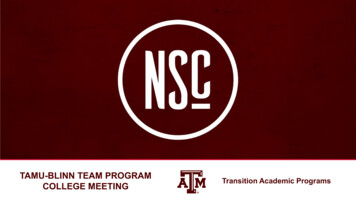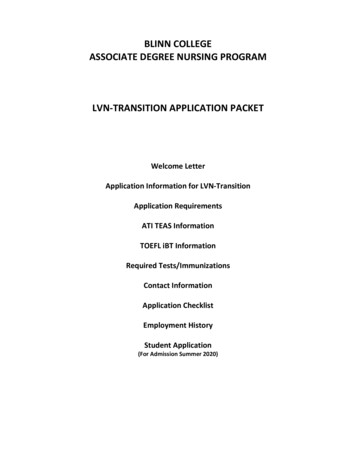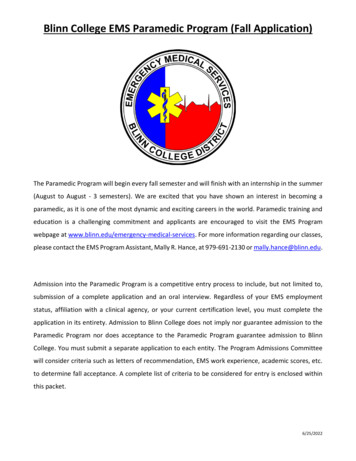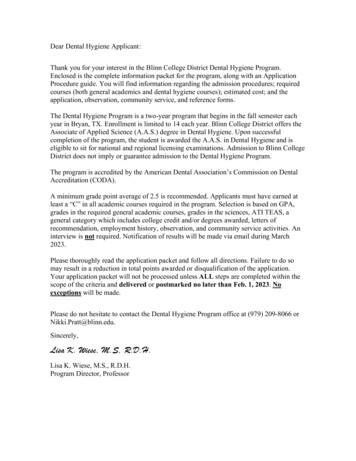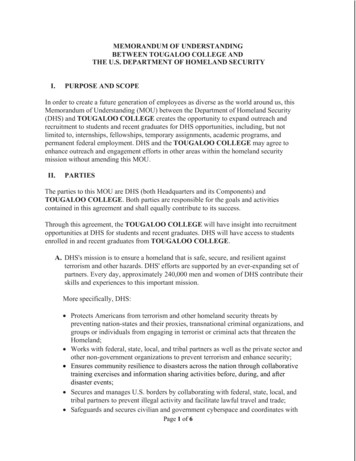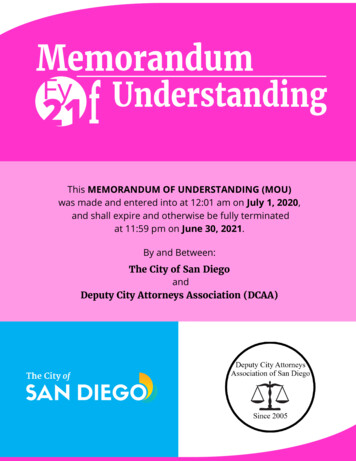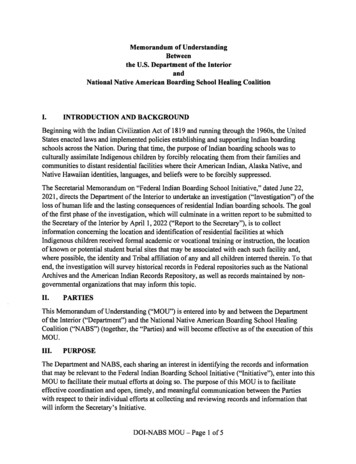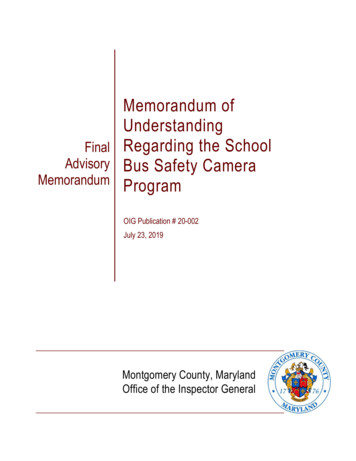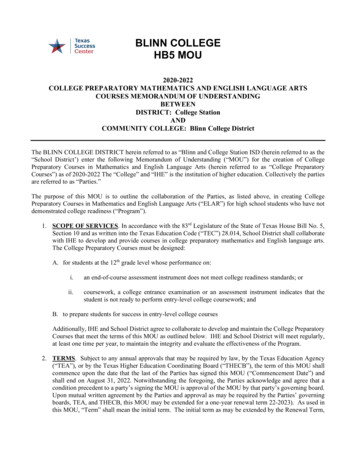
Transcription
BLINN COLLEGEHB5 MOU2020-2022COLLEGE PREPARATORY MATHEMATICS AND ENGLISH LANGUAGE ARTSCOURSES MEMORANDUM OF UNDERSTANDINGBETWEENDISTRICT: College StationANDCOMMUNITY COLLEGE: Blinn College DistrictThe BLINN COLLEGE DISTRICT herein referred to as “Blinn and College Station ISD (herein referred to as the“School District’) enter the following Memorandum of Understanding (“MOU”) for the creation of CollegePreparatory Courses in Mathematics and English Language Arts (herein referred to as “College PreparatoryCourses”) as of 2020-2022 The “College” and “IHE” is the institution of higher education. Collectively the partiesare referred to as “Parties.”The purpose of this MOU is to outline the collaboration of the Parties, as listed above, in creating CollegePreparatory Courses in Mathematics and English Language Arts (“ELAR”) for high school students who have notdemonstrated college readiness (“Program”).1. SCOPE OF SERVICES. In accordance with the 83rd Legislature of the State of Texas House Bill No. 5,Section 10 and as written into the Texas Education Code (“TEC”) 28.014, School District shall collaboratewith IHE to develop and provide courses in college preparatory mathematics and English language arts.The College Preparatory Courses must be designed:A. for students at the 12th grade level whose performance on:i.an end-of-course assessment instrument does not meet college readiness standards; orii.coursework, a college entrance examination or an assessment instrument indicates that thestudent is not ready to perform entry-level college coursework; andB. to prepare students for success in entry-level college coursesAdditionally, IHE and School District agree to collaborate to develop and maintain the College PreparatoryCourses that meet the terms of this MOU as outlined below. IHE and School District will meet regularly,at least one time per year, to maintain the integrity and evaluate the effectiveness of the Program.2. TERMS. Subject to any annual approvals that may be required by law, by the Texas Education Agency(“TEA”), or by the Texas Higher Education Coordinating Board (“THECB”), the term of this MOU shallcommence upon the date that the last of the Parties has signed this MOU (“Commencement Date”) andshall end on August 31, 2022. Notwithstanding the foregoing, the Parties acknowledge and agree that acondition precedent to a party’s signing the MOU is approval of the MOU by that party’s governing board.Upon mutual written agreement by the Parties and approval as may be required by the Parties’ governingboards, TEA, and THECB, this MOU may be extended for a one-year renewal term 22-2023). As used inthis MOU, “Term” shall mean the initial term. The initial term as may be extended by the Renewal Term,
College Preparatory Course MOUor such shorter period of time in the event of termination of this MOU.3. COURSE DEVELOPMENT/CURRICULUM.A. The College Preparatory Courses will be developed by the School Districts. The IHE will providecurriculum framework and the final exam. The School Districts will be responsible for implementation.B. Students enrolled in College Preparatory Courses will not earn college credit for those courses. SchoolDistricts will designate personnel to monitor the quality of instruction in order to ensure compliancewith this MOU.C. School District will provide all required materials, including textbooks, syllabi, course packets, andother materials needed for enrollment in the College Preparatory Courses.4. FACULTY SELECTION, SUPERVISION, AND EVALUATION. School District will assign highlyqualified faculty for each high school offering the College Preparatory Courses. Appropriate SchoolDistrict high school faculty will meet regularly, at least one time per year, with appropriate IHE faculty toensure that each course is aligned with the Program’s expectations.5. LOCATION OF CLASSES. College Preparatory Courses developed will be held on the campus of theSchool District high schools offering the course(s).6. PARENTAL INVOLVEMENT AND OUTREACH. School District shall provide a notice to eachdistrict student who has not demonstrated college readiness and to the parent or guardian regarding thebenefits of enrolling in the College Preparatory Courses. School District personnel, counselors, andadministrators will be responsible for all communication with parents. IHE personnel will not be expectedto communicate with parents.7. IDENTIFYING AND ADMITTING COLLEGE PREPARATORY STUDENTS. Each SchoolDistrict will assume responsibility for providing information to potential college preparatory students. IHEmay collaborate with the School District to hold an information session at the School District for potentialstudents and their parents.8. COURSE SUCCESS AND COLLEGE READINESS.A. An end-of-course assessment instrument for each of the College Preparatory Courses will be developedand adopted by IHE and School District to ensure the rigor of the College Preparatory Courses.B. The ISD instructor or administrator will contact the Blinn College Dual Credit Office,(dualcredit@blinn.edu, 979-209-8218) prior to December 1st for the fall term and prior to May 1st for thespring term requesting the end of course assessment and scoring instructions from Blinn College. (SeeHB5 College Preparatory English Content Framework, Appendix A.)C. For the ELAR and Mathematics College Preparatory Courses, a student earning a grade of 70 or abovein a particular course will demonstrate proficiency in the course and will be eligible to enroll in anentry-level college level English composition or Mathematics course at Blinn College, up to twentyfour (24) months after high school graduation The student must enroll in the student's first college-levelcourse in the exempted content area in the student's first year of enrollment at the IHE. If the studentdoes not earn a grade of “C” or higher in the exempted content area, the student must be tested for thePage 2Adapted by the Texas Success Center from ESC 20 House Bill 5 College Preparatory Resources (http://www.esc20.net/default.aspx?name ais sup.HB5.CollegePrep) ‘Alamo Colleges and UTSA College Prep Course MOU Final June 2014’
College Preparatory Course MOUremaining area(s) and comply with all other Success Initiative requirements.D. Specific to the Mathematics College Preparatory Courses, assessments will comprise 80% of the finalcourse grade with no single assessment weighted over 20 %. If a School District allows students to retest, the score on this assessment must be limited to a 70. The end-of-course assessment (final exam)and scoring instructions will be provided by the IHE. This end-of-course assessment will account for20% of the final average and may not be retaken or revised. (See HB5 College PreparatoryMathematics Content Framework, Appendix B.)E. Specific to the ELAR Preparatory Courses, major papers and reading assessments will comprise 50%of the final course grade with no single assessment weighted over 10%, except the end-of-courseassessment, weighted at 20% of the final course grade. Daily grades will comprise 30% of the finalcourse grade. If a School District allows students to retest or revise a graded paper, the score on thisassessment must be limited to a 70. The end-of-course assessment may not be retaken or revised.F. Successful completion of the college level course will demonstrate Texas Success Initiative (“TSI”)compliance.9. PROFESSIONAL DEVELOPMENT. Appropriate School District high school faculty will meetregularly, at least one time per year with appropriate IHE faculty to ensure that College Preparatory Coursesare aligned with the Program expectations. The School District will develop and provide professionaldevelopment opportunities for the teachers responsible for the College Preparatory Courses. Evidence ofcompletion of professional development activities will be granted by an approved service provider.10. PROGRAM EVALUATION. School District and IHE will develop a plan for the evaluation of theCollege Preparatory Courses to be completed each year of the MOU. The evaluation will include, but isnot limited to, disaggregated attendance and retention rates, satisfactory progress in the College PreparatoryCourses, state assessment results, SAT/ACT, TSI readiness, qualification of College Preparatory Courses’instructors, and adequate progress toward the college-readiness of the students in the College PreparatoryCourses. Periodic independent evaluation of College Preparatory Courses’ content and delivery will becoordinated by Education Service Center-Region 20 (“ESC-20”). Program evaluation will consist of aholistic review of each School District’s College Preparatory Course on a semester basis prior to Spring2019. Beginning Spring 2019, the Program evaluation will consist of a more rigorous review to includedata of student success in corresponding IHE gateway courses. The Program evaluation results will beshared with School District and IHE administration and will be used in the creation of ongoing professionaldevelopment.11. TRANSCRIPTION OF CREDIT. The transcription of high school credit and assessment results is theresponsibility of School District. School District determines how the grades will be recorded in the highschool transcript for GPA and ranking purposes. IHE and School District will use an agreed uponnomenclature for determining TSI-compliance. The final exam will be available beginning December 1 forfall and May 1 for spring and must be completed within a two-week time period from the date it is receivedby the ISD. The ELA essay portion of the final should be administered in a proctored environment asrequired by TEA for testing integrity and security. School District will submit final exams to the BlinnCollege Office of Dual Credit by the end of the fall and/or spring term. School District will submit the listof students to be certified to receive the appropriate TSI waiver to the Office of Dual Credit.12. COMPLIANCE. School District agrees:Page 3Adapted by the Texas Success Center from ESC 20 House Bill 5 College Preparatory Resources (http://www.esc20.net/default.aspx?name ais sup.HB5.CollegePrep) ‘Alamo Colleges and UTSA College Prep Course MOU Final June 2014’
College Preparatory Course MOUA.To certify that their sites are Americans with Disabilities Act (“ADA”) compliant.B.To comply with all applicable provisions of the Family Education Rights and Privacy Act, 20U.S.C. §1232g.C.In all cases, to comply with all federal, state, and local laws applicable to this MOU.D.To have in place and abide by a policy prohibiting sexual harassment.13. AMENDMENTS/REVISIONS. This MOU may only be amended by mutual written agreement of theparties.14. NOTICE. All notices, demands, or requests from one party to the other may be personally delivered orsent by email and mail, certified or registered, postage prepaid, to the addresses stated in this section, andare considered to have been given at the time of personal delivery or mailing.15. TERMINATION. IHE reserves the right to terminate this MOU upon service of notice to School Districtsixty (60) days prior to the expiration of any academic term during the Term or Renewal Term of this MOU.All notices, demands, or requests to IHE shall be given or mailed to:Leighton SchubertExecutive Vice Chancellor and General Counsel of Blinn College District902 College Ave.Brenham, TX 77833All notices, demands, or requests to College Station ISD shall be given or mailed to:Mike MartindaleSuperintendent1812 Welsh Ave.College Station, TX 77840Phone: (979) 764-5455Email: mmartindale@csisd.org16. CHOICE OF LAW. This MOU is to be performed in Washington County, Texas, and is governed by theConstitution and the internal laws of the State of Texas. The exclusive venue of any suit arising from thisMOU shall be in Washington County, Texas.17. NONASSIGNABILITY. Parties herein shall not assign any interest in this MOU and shall not transferany interest in same without prior written consent of the Parties.18. INDEPENDENT CONTRACTOR. Parties shall provide services pursuant hereto, as independentcontractors. The Parties understand that the tasks, the details of which the Parties do not have legal rightto control and no such control are assumed by this MOU. This MOU does not create an employmentrelationship, partnership, or joint venture between the Parties (or its employees). None of the Parties norits employees shall be deemed employees of one another for any purpose whatsoever, and none shall beeligible to participate in any benefit program provided by a party.Page 4Adapted by the Texas Success Center from ESC 20 House Bill 5 College Preparatory Resources (http://www.esc20.net/default.aspx?name ais sup.HB5.CollegePrep) ‘Alamo Colleges and UTSA College Prep Course MOU Final June 2014’
College Preparatory Course MOU19. NO THIRD PARTY BENEFICIARIES. Nothing in this MOU, express or implied, is intended or shall beconstrued to confer upon any person, firm or corporation other than the Parties hereto and their respectivesuccessors or assigns, any remedy or claim under or by reason of this MOU or any term, covenant or conditionhereof, as third party beneficiaries or otherwise, and all of the terms, covenants and conditions hereof shall befor the sole and exclusive benefit of the Parties hereto and their successors and permitted assigns.20. COUNTERPARTS. This MOU may be executed in counterparts, each one of which shall be an original,and different Parties may sign different counterparts, all of which shall constitute but one document.21. ENTIRE AGREEMENT. This MOU and any and all exhibits attached thereto shall constitute the completeagreement between the Parties relating to the subject matter herein and supersedes all prior andcontemporaneous proposals, agreements, understandings, representations, purchase orders, invoices andcommunications, whether oral or written relating to the subject matter herein.IN WITNESS WHEREOF, the Parties have caused this MOU to be signed by its duly authorized officer, tobecome effective as of the date stated above.BLINN COLLEGE DISTRICT:By:Mary Hensley Ed.D.Chancellor of the Blinn College DistrictDateCOLLEGE STATION ISD:By:Mike MartindaleSuperintendentCollege Station ISDDatePage 5Adapted by the Texas Success Center from ESC 20 House Bill 5 College Preparatory Resources (http://www.esc20.net/default.aspx?name ais sup.HB5.CollegePrep) ‘Alamo Colleges and UTSA College Prep Course MOU Final June 2014’
College Preparatory Course MOUAppendix AHB 5 College Preparatory EnglishContent Framework forDRIW0326 Developmental Integrated Reading and WritingTarget Students: This course is appropriate for any 12th grade student whose performance on measuresoutlined in TEC §28.014 indicates that the student is not on track to perform entry-level collegecoursework in English Language Arts. This course is designed to advance college and career readiness.Recommended Prerequisites: Satisfactory performance on the English I & II STAAR/EOCexaminations and successful course completion of English III.Course Description:Students will learn to investigate academic texts, construct supported interpretations and arguments foran authentic audience, and acquire academic habits of thought. Reading instruction will focus ondeveloping critical reading skills for comprehension, interpretation, and analysis. In writing, studentswill develop skills through composing with specific purpose, situation, genre, and audience in mind.Students will write a variety of effective formal and informal texts. To learn to integrate reading andwriting, students will use an inquiry approach to analyze, synthesize, and make value judgmentsregarding text and writing. This course is designed to prepare students for college-level reading andwriting intensive courses. Successful completion of this course, as defined by the memorandum ofunderstanding (MOU) with the partnering institution(s), grants the student an exemption to TSIrequirements for reading and writing at the partnering institution(s).Course Goal:The goal of this course is to develop students as critical readers, thinkers, and purposeful writersprepared for college success in introductory courses across disciplines.Student Learning Outcomes & Learning Objectives:Upon successful completion of this course, students will be able to:1. Set individual learning goals, and self-monitor during the learning process by articulatingdifficulties, identifying solutions, and asking for assistance when appropriate.2. Determine the meaning of unfamiliar vocabulary within text by analyzing context and usingappropriate resources; incorporate expanded vocabulary into oral and written communication.3. Describe, communicate, and apply insights gained from reading and writing a variety of textsthrough reflection.4. Interact with text to discover evidence of author’s purpose, intended audience, tone/voice, andmessage across a variety of texts.5. Analyze text to determine effective support and construct well-reasoned inferences acrossmultiple texts of varying lengths and complexities.6. Discuss ideas in a variety of formal and informal contexts, contribute to group dialogue, andincorporate others’ ideas into individual work and learning approach when appropriate.7. Evaluate relevance and quality of ideas and information in recognizing, formulating, andPage 6Adapted by the Texas Success Center from ESC 20 House Bill 5 College Preparatory Resources (http://www.esc20.net/default.aspx?name ais sup.HB5.CollegePrep) ‘Alamo Colleges and UTSA College Prep Course MOU Final June 2014’
College Preparatory Course MOUdeveloping a claim; effectively modify the claim based on results of inquiry.8. Compose a variety of texts that demonstrate depth of understanding, clarity of focus, logicalprogression of ideas, and employment of rhetorical strategies.9. Develop a research plan by generating questions, considering multiple arguments and ideas,gathering valid information from credible sources, and ethically incorporating outside ideas andperspectives into writing.10. Plan investigations, collect and interpret data, and effectively communicate findings in a varietyof formats.11. Collaborate with peers throughout the reading and writing process to build upon ideas,investigate a problem, explore complexities of issues, and improve writing.12. Revise writing to increase continuity of ideas, academic tone, accuracy of communication, andclarity of purpose.Outline of Instruction:I. Writing(A)Determining effective approaches, forms, and rhetorical techniques to communicatepurpose to an audience.1. Generating ideas and gathering information.(C)Evaluating relevance, quality, sufficiency, and depth of preliminary ideas andinformation.(D)Formulating a thesis.2. Recognizing the importance of revision as the key to effective writing.(F)Edit writing for proper voice, tense, and syntax.II. Reading(A)Making complex inferences, and supporting inferences with text evidence.1. Understanding and incorporating new vocabulary and academic concepts.(C)Analyzing and evaluating information within and across texts and genres.(D)Connecting literary and other texts to personal experience and historicalcircumstances.III. Communication Skills1. Understanding formal and informal communication.(B)Developing effective speaking styles for group and one-on-one situations.(C)Applying listening skills in a variety of settingsPage 7Adapted by the Texas Success Center from ESC 20 House Bill 5 College Preparatory Resources (http://www.esc20.net/default.aspx?name ais sup.HB5.CollegePrep) ‘Alamo Colleges and UTSA College Prep Course MOU Final June 2014’
College Preparatory Course MOUIV. Research(A)Formulating research questions.1. Exploring research topics.(C)Developing a research plan.2. Gathering relevant sources.(E)Evaluating validity and reliability.(F)Synthesizing and organizing information.3. Designing and presenting.(H)Using source material ethically.Resources:TASA on iTunes U: The Texas Association of School Administrators (TASA) announces the expansion of digital resourcesin TASA on iTunes U to now include content that school districts may use to satisfy the college preparatory courserequirements in House Bill 5. Building upon the existing resources available in TASA on iTunes U , TASA engagedexperienced teachers, content specialists, and higher education faculty to create a collection of digital resources that arealigned with the Texas College and Career Readiness Standards and the TEKS. Districts can rely on this vetted compilationof interactive, online content to develop–in consultation with their higher education partner–their own college preparatorycourses in responding to this HB 5 requirement.Southern Regional Educational Board: Literacy Ready: The SREB’s college readiness courses were developed by a team ofstate representatives from K-12 through higher education from the first five partner states — Arkansas, Georgia, Kentucky,North Carolina, and Tennessee. This diverse team worked together for two years to develop the courses and build consensusaround how to prepare students for postsecondary work. Representatives from the additional partner states assisted inreviewing and revising of the courses before publication. The initial classroom version of the SREB Readiness Courses areavailable for any state, district, school or teacher to download online, free of charge, as of November 2013.SREB plans to update future versions of the courses based on feedback from classroom teachers.With the help of Apple Inc., SREB is also building online versions of the courses for increased flexibility for states andschools. These courses will be available in spring 2014 on a new SREB iTunes U page. SREB plans to work with states toensure a process for measuring the extent to which students emerge from these courses college-ready; and evaluate courseeffectiveness. This course teaches students strategies for reading and truly understanding specific kinds of complex texts inall subjects — reading a biology textbook, for example, is different than reading short stories or history research articles.Students learn to develop and defend ideas from the text and write about them in different college-level formats.College Readiness Assignments for Texas: College Readiness Assignments for Texas (CRAfT) is a project based at TheUniversity of Texas at Austin and is supported by a generous grant from the Texas Higher Education Coordinating Board(THECB). As part of the CRAfT project, high school and college educators collaborated to develop College ReadinessAssignments (CRAs) aligned to the Texas College and Career Readiness Standards (CCRS).SA Ready: College—Career—Life: SA Ready is a free platform that gives teachers access to high quality lesson plans andteaching resources. Developed in partnership between Generation TX San Antonio and Educational Policy ImprovementCenter (EPIC), SA Ready is aligned with Texas College and Career Readiness Standards (CCRS) and helps prepare teachersto implement college-and career-ready lessons.This framework for the HB 5 College Preparatory Course in English language arts is the result of a collaborative process organized by the Texas SuccessCenter (TSC) at the Texas Association of Community Colleges (TACC). A committee consisting of content experts from both Higher Education and K-12educators worked collaboratively to develop and revise this framework, seeking input from educators across the state. This feedback, along with thePage 8Adapted by the Texas Success Center from ESC 20 House Bill 5 College Preparatory Resources (http://www.esc20.net/default.aspx?name ais sup.HB5.CollegePrep) ‘Alamo Colleges and UTSA College Prep Course MOU Final June 2014’
College Preparatory Course MOULearning Outcomes in the Lower-Division Academic Course Guide Manual (ACGM), the Texas College and Career Readiness Standards (CCRS), andother relevant materials informed the committee’s work. The HB 5 College Preparatory Course framework development is an ongoing, rigorous processdesigned to be inclusive of voices from multiple stakeholders with the wish to contribute feedback that would benefit the continued development of thisframework, please email HB5ELAR@tacc.org.Appendix BHB 5 College Preparatory MathematicsContent FrameworkTarget Students: Target students are those students failing to meet the college readiness standard as defined byHouse Bill 5, particularly students who did not take Algebra II or did not maintain a C average in Algebra II.Course Description: Intermediate Algebra is the study of factoring rules, rational expressions, rationalexponents, radicals, complex numbers, inequalities, inequalities containing absolute values, quadratic equations,linear equations, and equations with radicals, rational expressions, exponents, and functions. Calculator use isnot recommended for this course (including the department final examination) as calculators are not allowed inclasses when taught on campus. An average of C or better indicates the student has met the Blinn Collegecriteria for Math 0312, and the student is prepared for Blinn College Math 1314, College Algebra, withoutfurther assessment remediation.Course Goals: The student should maintain at least a C average on all course work factoring rules, rationalexpressions, rational exponents, radicals, complex numbers, inequalities, inequalities containing absolute values,quadratic equations, linear systems, and equations with radicals, rational expressions, and exponents.Course Resources: Technology is required per House Bill 5. Please see the attached list of suggested courseresources.Final Exam and Grading Policy: Students will take the Blinn College Departmental Final Examination. The final examination (post-test) will be distributed to the School by Blinn College no later than May 1 ofeach year.The course evaluation instruments shall consist of at least five major grades including the finalexamination.Other evaluation methods may include quizzes, homework, and projects when appropriate.The scores from daily grades and major exams will comprise not more than 80% of the overall grade.The Blinn College Final Exam will determine at least 20% of the overall grade.Competency will be measured by a minimum overall average of C for the course. This indicates that thestudent has met the Blinn College criteria for Math 0312; and, the student is prepared for Blinn CollegeMath 1314, College Algebra, without further assessment or remediation.Outline of Instruction:Page 9Adapted by the Texas Success Center from ESC 20 House Bill 5 College Preparatory Resources (http://www.esc20.net/default.aspx?name ais sup.HB5.CollegePrep) ‘Alamo Colleges and UTSA College Prep Course MOU Final June 2014’
College Preparatory Course MOUPage 10Adapted by the Texas Success Center from ESC 20 House Bill 5 College Preparatory Resources (http://www.esc20.net/default.aspx?name ais sup.HB5.CollegePrep) ‘Alamo Colleges and UTSA College Prep Course MOU Final June 2014’
College Preparatory Course MOUPage 11Adapted by the Texas Success Center from ESC 20 House Bill 5 College Preparatory Resources (http://www.esc20.net/default.aspx?name ais sup.HB5.CollegePrep) ‘Alamo Colleges and UTSA College Prep Course MOU Final June 2014’
A. An end-of-course assessment instru ment for each of the College Prep aratory Courses will be developed and adopted by IHE and School District to ensure the rigor of the College Preparatory Courses. B. The ISD instructor or administrator will contact the Blinn College Dual Credit Office,
